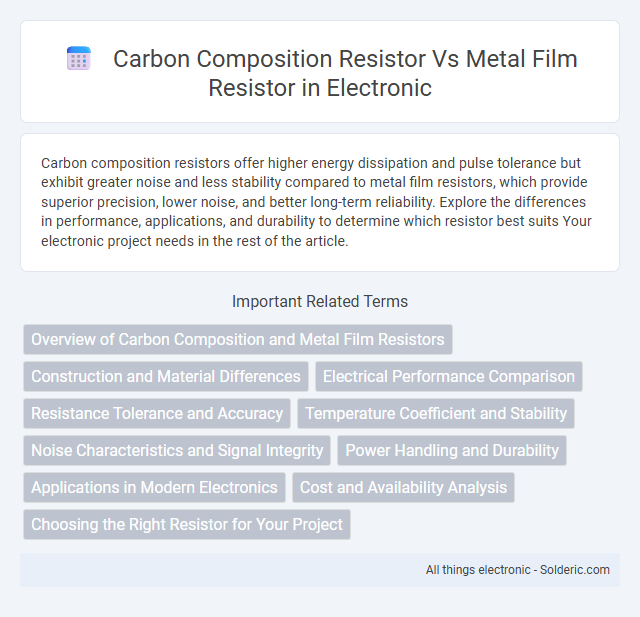Carbon composition resistors offer higher energy dissipation and pulse tolerance but exhibit greater noise and less stability compared to metal film resistors, which provide superior precision, lower noise, and better long-term reliability. Explore the differences in performance, applications, and durability to determine which resistor best suits Your electronic project needs in the rest of the article.
Comparison Table
| Feature | Carbon Composition Resistor | Metal Film Resistor |
|---|---|---|
| Construction | Carbon and binder mixture | Thin metal film on ceramic core |
| Tolerance | +-5% to +-20% | +-0.1% to +-1% |
| Temperature Coefficient | High (up to +-200 ppm/degC) | Low (typically +-50 ppm/degC) |
| Noise Level | High noise generated | Low noise, suitable for precision circuits |
| Power Rating | Up to 5W (higher power types available) | Typically 0.125W to 1W |
| Stability and Reliability | Less stable, degrades over time | Highly stable and long-lasting |
| Frequency Response | Poor at high frequencies | Good high-frequency response |
| Applications | Surge protection, pulse circuits | Precision analog circuits, audio equipment |
| Cost | Lower cost | Higher cost |
Overview of Carbon Composition and Metal Film Resistors
Carbon composition resistors consist of a mixture of carbon particles and a binder, offering high energy pulse tolerance and noise generation, making them suitable for vintage electronics and high-energy applications. Metal film resistors feature a thin metal layer deposited on a ceramic substrate, providing superior precision, stability, and low noise, ideal for audio circuits and precision electronics. Your choice depends on the required tolerance, stability, and noise performance for your specific application.
Construction and Material Differences
Carbon composition resistors are made from a mixture of carbon dust and a binding resin, molded into a cylindrical shape with axial leads, offering a higher tolerance and noise level due to their granular material structure. Metal film resistors consist of a thin metal oxide film deposited onto a ceramic substrate, providing greater precision, stability, and lower noise thanks to their uniform, solid-state composition. Your choice between these resistors should consider the application's need for accuracy and noise performance, where metal film resistors typically excel over carbon composition types.
Electrical Performance Comparison
Carbon composition resistors exhibit higher noise levels and less stability over time compared to metal film resistors, which offer superior precision with low temperature coefficients and excellent tolerance. Metal film resistors maintain consistent electrical performance under varying environmental conditions, making them ideal for applications demanding accuracy and reliability. Your choice between these resistor types should consider the need for noise reduction and long-term stability in circuit design.
Resistance Tolerance and Accuracy
Metal film resistors typically offer superior resistance tolerance, commonly within +-1% or better, compared to carbon composition resistors which generally have tolerances around +-5% to +-20%. The enhanced accuracy of metal film resistors stems from their stable resistive material and precise manufacturing process, resulting in minimal resistance drift over time and temperature fluctuations. Carbon composition resistors exhibit higher noise levels and variability, making them less suitable for applications requiring precise and reliable resistance values.
Temperature Coefficient and Stability
Carbon composition resistors exhibit a higher temperature coefficient, typically around +-2000 ppm/degC, resulting in significant resistance variation with temperature changes, while metal film resistors offer much lower temperature coefficients, often as low as +-50 ppm/degC, providing greater precision. Metal film resistors also demonstrate superior long-term stability and reliability under varying environmental conditions due to their tightly controlled manufacturing processes. Your choice should favor metal film resistors for applications requiring consistent performance and minimal drift over time.
Noise Characteristics and Signal Integrity
Carbon composition resistors generate higher noise levels due to their granular carbon material structure, which introduces significant excess noise and can degrade signal integrity in sensitive electronic circuits. Metal film resistors exhibit superior noise performance with low thermal noise and minimal excess noise, ensuring stable and clean signal transmission ideal for high-precision and audio-frequency applications. The superior stability and lower noise of metal film resistors make them the preferred choice for maintaining high signal integrity in critical electronic designs.
Power Handling and Durability
Metal film resistors offer superior power handling and durability compared to carbon composition resistors, as they can withstand higher temperatures and exhibit lower noise levels. Carbon composition resistors tend to degrade faster under thermal stress and deliver less stable resistance values over time. Choosing metal film resistors enhances your circuit's reliability and longevity, especially in demanding applications.
Applications in Modern Electronics
Carbon composition resistors are commonly used in high-energy pulse circuits and vintage audio equipment due to their ability to withstand high energy surges and provide a distinct tonal quality. Metal film resistors dominate precision applications such as analog circuits, sensors, and medical devices because of their low noise, tight tolerance, and high stability. Modern electronics increasingly favor metal film resistors for their reliability in temperature-sensitive environments and high-frequency performance.
Cost and Availability Analysis
Carbon composition resistors are generally more affordable and widely available for low-cost applications due to their simple manufacturing process but tend to have less precision and stability. Metal film resistors, while slightly more expensive, offer better tolerance, reliability, and temperature stability, making them favored in high-performance or industrial circuits. Your choice between these resistors should consider budget constraints and the specific performance requirements of your project.
Choosing the Right Resistor for Your Project
Choosing the right resistor for your project depends on factors like tolerance, stability, and noise levels. Carbon composition resistors offer high energy dissipation and pulse handling but have higher noise and wider tolerance, making them suitable for vintage or high-voltage applications. Metal film resistors provide better precision, lower noise, and improved temperature stability, ensuring reliable performance in circuits requiring accuracy and minimal signal distortion.
Carbon composition resistor vs metal film resistor Infographic

 solderic.com
solderic.com